
19 min
0
03.29.2024
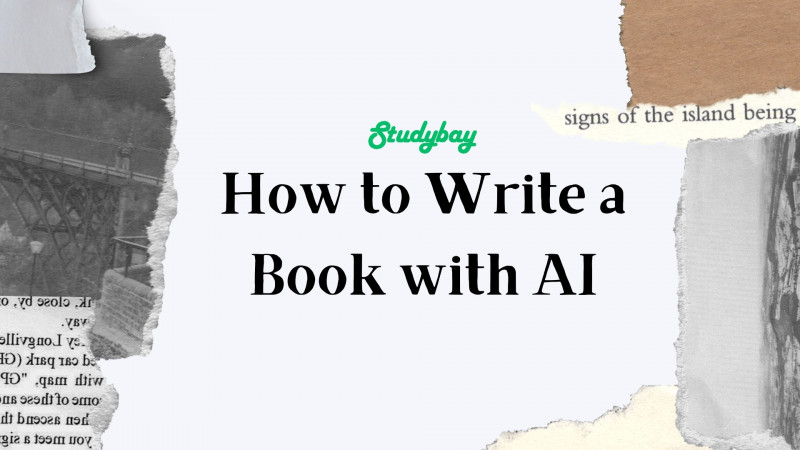
Artificial intelligence or AI sounds like a scary prospect to some people. Science fiction has said that AI could get smarter than humanity and might even take over. These sensationalist takes aren’t what you should be paying attention to. AI is not something to be afraid of; it is a tool that can help you achieve what you want.
In this case, using AI to help write a book isn’t as difficult as some would make it seem. In fact, artificial intelligence is well-suited to the task of being a co-author for your book. AI is a collection of best practices packaged into a straightforward interface. It’s like developing code without having to write it. With the proper prompts, you could easily have AI writing your book alongside you. Before we examine how to use an AI writer, we must examine what AI writers are.
How AI Writing Tools Work
AI writing tools are similar to other types of AI in that they learn from what others have already done. They use tricks inspired by how our brains work to understand things like language and pictures. Imagine teaching a computer to recognize cats in photos: you'd show it lots of cat pictures, and it would learn to spot common features.
Machine learning algorithms enable AI tools to learn from large datasets, recognize patterns, and make predictions or decisions without explicit programming. Natural language processing allows machines to understand and generate human language, facilitating communication and interaction between humans and computers.
Neural networks, inspired by the structure of the human brain, play a crucial role in many AI tools, allowing them to process complex data and learn patterns. However, writing with an AI won’t solve every problem you might have. Certain ethical concerns come up when we discuss these tools.
Common Concerns and Ethical AI Writing
AI writing tools are not flawless, and they introduce an element of uncertainty when creating written work. Over time, many people have raised concerns about ethics in AI-aided content. When using AI to write a book, an author should pay particular attention to these elements.
Ethical Concerns
Users may encounter ethical dilemmas when using AI tools. For instance, there's the issue of privacy—AI systems often rely on vast amounts of personal data, raising questions about how that data is collected, stored, and used. Additionally, there are concerns about AI being used for malicious purposes, like spreading misinformation or manipulating public opinion. Ensuring that AI technologies are developed and used responsibly is crucial to address these ethical concerns.
Plagiarism
Another problem users may face is plagiarism. AI tools can generate content quickly and efficiently, but there's a risk that this content may be plagiarized from existing sources. Users need to be vigilant about adequately attributing sources and ensuring that the content generated by AI tools is original and ethically produced.
Bias
Bias is a significant issue in AI, as these systems learn from historical data that may contain biases. For example, AI algorithms used to write a book may need to weigh both the pros and cons of a position, but most of the data in the LLM is skewed towards one side of the argument. Depending on the data set, this could lead to a book heavily slanted towards one side or another.
AI Hallucinations
AI doesn’t dream, but it does hallucinate vividly from time to time. These hallucinations occur when AI systems produce realistic but entirely fabricated content, such as images, videos, or text. Users should critically evaluate AI-generated content and be cautious about sharing or relying on it without verification.
Job Displacement
The rise of AI technologies has led to concerns about job displacement, as automation may replace certain tasks traditionally performed by humans. While AI can enhance productivity and create new job opportunities, it’s not a perfect solution. While it can help do certain things, it falls woefully short in elements of personal style.
How To Write a Book Using AI
The meat of the matter lies with the question: “How do I use AI to write a book?” AI can be instrumental in developing the framework for a book and even helping with ideas to flesh out certain sections of the book.
Generating Ideas
The first thing any author has to do when writing a book using AI is generate ideas. By inputting prompts or themes, these tools can swiftly generate a wealth of creative suggestions, from character concepts to plot twists. They offer a fresh perspective and can inspire new directions for your story.
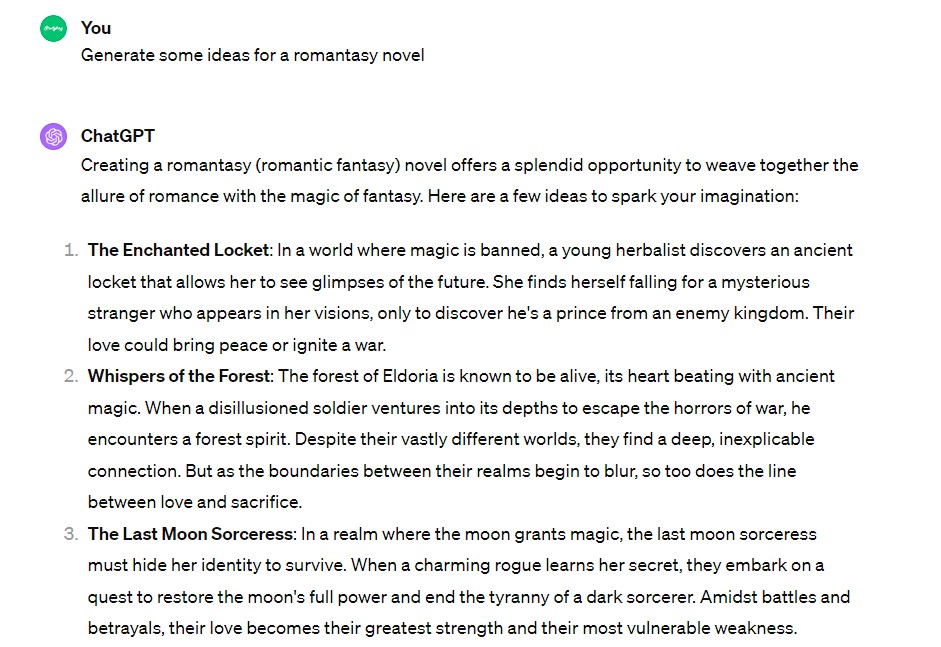
As you can see, while the ideas we asked ChatGPT to generate are quite different in their plots, you might remember a few books with the similar premise. That's why you should never completely rely on such tools and rather using your own imagination.
Researching Your Niche
Nonfiction books are usually written within a niche, which requires the author to perform some deep research into the topic. AI writers can be invaluable for research. They can sift through vast amounts of data, retrieving relevant information efficiently. However, it's crucial to verify the accuracy and reliability of the data provided by AI tools.
While using AI for writing books can assist in gathering insights and compiling information, human oversight is essential to ensure that the content aligns with authoritative sources and meets the standards of credibility. You can’t just accept what AI tells you because it can hallucinate and state things as facts that are pure invention. Therefore, while AI writers streamline the research process, authors must still meticulously review and confirm the data to maintain the integrity and accuracy of their work.
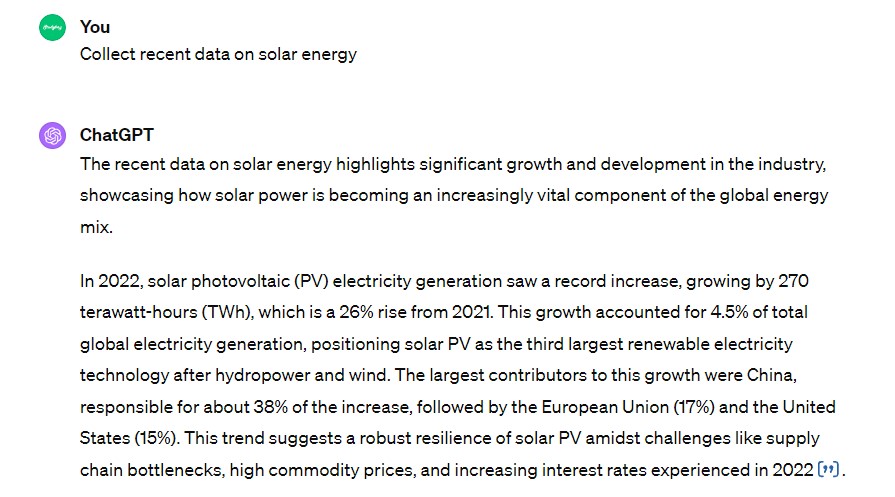
It's a good thing that the newest version of ChatGPT can provide links to the information it retrieved (the blue quotation marks that you can see on our screenshot link to the resource article), but you should still double-check the data provided as how we mentioned before, AI tools can sometimes hallucinate.
Creating Plot Structure
Fiction works typically follow a plot structure, but determining the beat of the plot could benefit from AI input. AI tools can analyze story elements and narrative arcs to suggest logical progressions, plot twists, and character developments. They help authors ensure that the storyline flows smoothly, maintaining coherence and engagement for the reader.
With their ability to quickly process vast amounts of data, AI writers can offer valuable insights into plot pacing, thematic coherence, and character motivations. Using AI for plot organization provides authors with a structured framework to build upon, enhancing their storytelling's overall quality and coherence. Unfortunately, AI can’t develop ideas; it only builds on the ideas you already feed it.
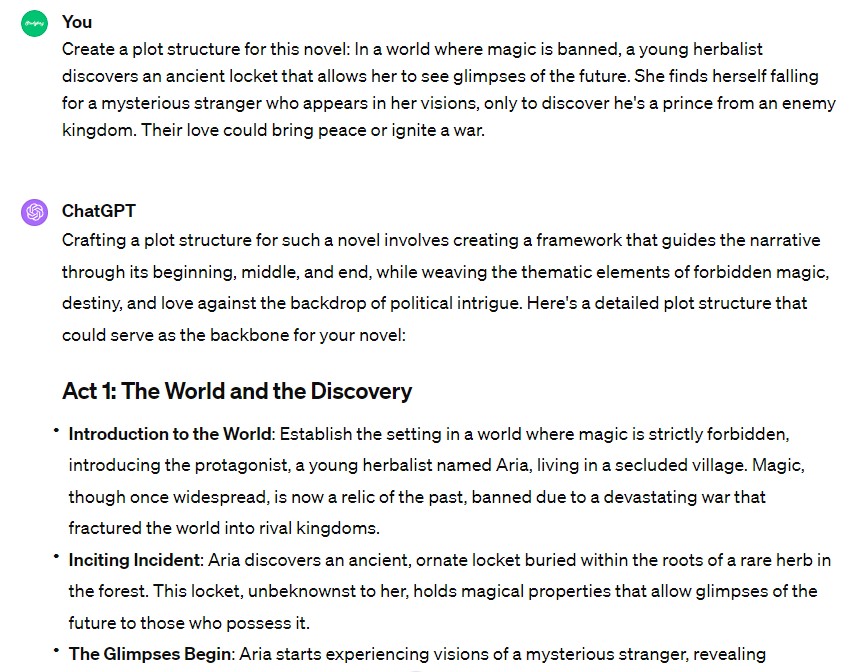
ChatGPT provided us with a pretty extensive storyline and while it might be tempting to use everything that it generated, we would advise not to, and just use this information as a reference check for the plot holes and consistency of your story.
Choosing a Title
If you use AI to write a book, you could also leverage its insight to give you a title. By analyzing the content and themes of the book, AI tools can suggest creative and catchy titles that capture the essence of the story. These suggestions can provide authors with inspiration and direction, helping them choose a title that resonates with their target audience and effectively communicates the book's content.
AI-generated titles can be a helpful starting point, but authors should evaluate them critically and select a title that aligns with their vision and branding. Ai can only suggest something to you, but that suggestion is based on data, not feelings. As an author, sometimes you have to “feel” the title speak to you.
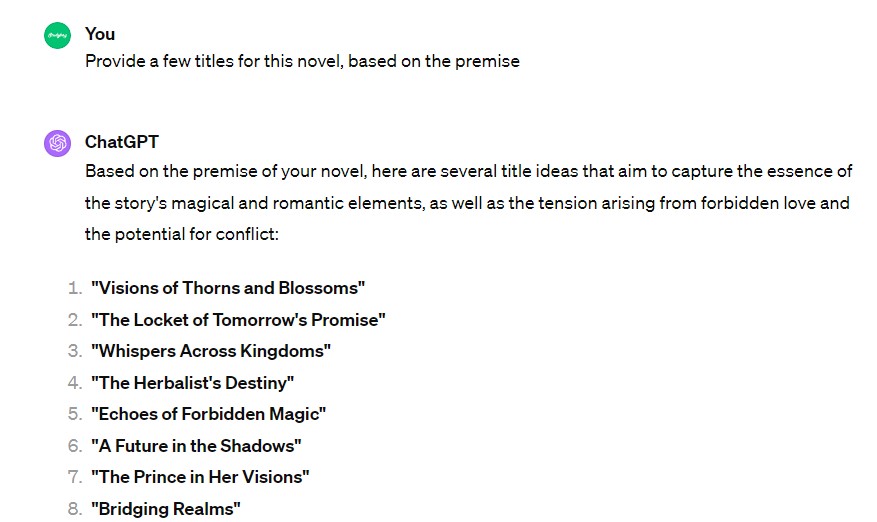
As we already have mentioned, AI lacks human creativity, and you can definitely see this in the titles provided. It just feels like each of them you have already seen on some book in the Barnes & Noble romantasy section.
Character Creation
Developing a character is a critical part of a story. By analyzing characters' characteristics, traits, and behaviors, AI tools can offer insights and suggestions to flesh out their personalities and backgrounds. These suggestions can include details such as backstory, motivations, and even quirks that add depth and complexity to the characters.
Using AI is much quicker than doing a manual character sketch and gives insights that some authors might not even spot in their initial draft. It is quick, but it can also lead to some derivative characters.
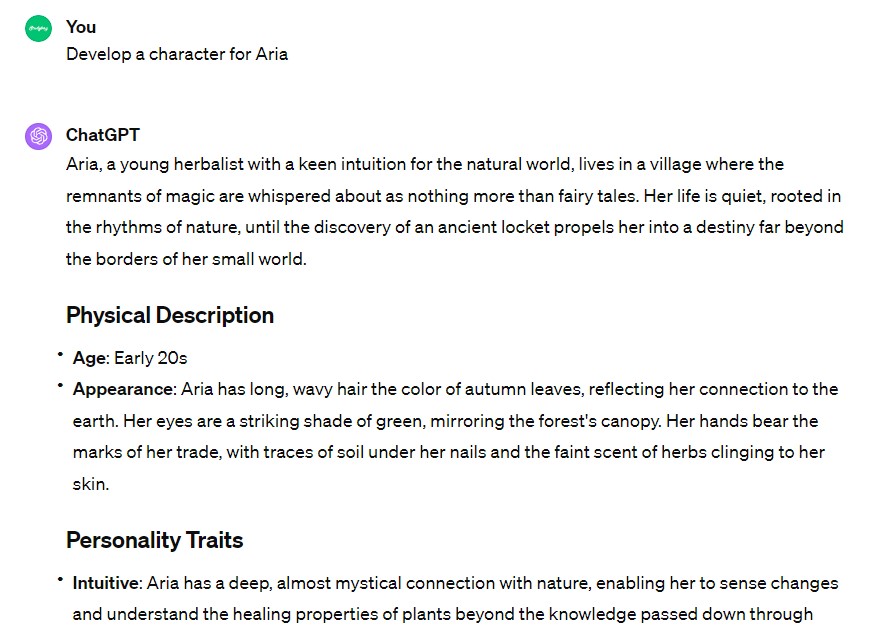
While you can use this feature as a way to enrich the character's biography and description, it definitely shouldn't be used as a main tool for development. Just look at this description we got from ChatGPT. "Hair the color of autumn leaves", "eyes are striking shade of green"... If it isn't Mary Sue herself.
Checking Grammar and Spelling
One of the benefits of writing books with AI is that your AI writing tool provides an easy way to check spelling and grammar. With advanced language processing capabilities, AI tools can quickly identify errors and suggest corrections. They can catch typos, punctuation, and grammatical errors, helping authors polish their work to perfection. Additionally, AI tools often explain suggested corrections, assisting authors in understanding and learning from their mistakes.
While AI can catch many mistakes, authors must review suggestions critically and consider the context to ensure that their writing maintains its intended meaning and style. AI can’t define your style as a writer for you; only you can do that.
Editing and Rewriting
AI is a tool, meaning it can run into problems now and again. If a text doesn't sound quite right or requires a shift in tone, AI can be a valuable aid for rewriting. With its language generation capabilities, AI tools can swiftly revise text to suit the desired tone, style, or context better.
Whether it's adjusting the formality, injecting humor, or refining clarity, AI can offer alternative phrasing and restructuring to enhance the overall effectiveness of the writing. However, writers still need to pay attention to their message while using these AI tools. Things like humor and formality will differ between situations, and the author has to refine what the AI gives them.
Creating a New Genre of Literature
Using AI to write books could lead to an entirely new iterative loop for authors. AI can develop unique combinations for situations. Initially, the AI produces variations of text that may contain elements of surprise, novelty, or unconventional thinking, often departing from conventional human norms. This is how you can use AI to write a story.
The human writer then enters the scene, acting as a curator and editor of these AI-generated outputs. They sift through the generated narratives, selecting elements that intrigue, inspire, or resonate with them. Through editing, recombination, and tweaking, the human writer refines and builds upon the AI outputs, infusing them with their own creative vision, storytelling techniques, and thematic explorations. The author adds humanity to the story.
This collaborative process pushes the boundaries of traditional storytelling, resulting in narratives that feel profoundly unfamiliar and alien-like compared to conventional human literature. The interplay between human imagination and AI-generated content creates hybrid narratives that blur the lines between human and machine authorship. These narratives often exhibit a unique blend of human emotion, cognitive complexity, and technological innovation, offering readers a glimpse into the creative potential of human-AI collaboration.
This iterative process is unique, unlike anything anyone has done before, because we’ve never had a tool like AI for something like this. The process could challenge traditional literary norms, potentially evolving writing as we know it. As authors continue to explore this collaborative frontier, we can expect to encounter narratives that push the boundaries of imagination and redefine the possibilities of storytelling in the digital age.
Advantages and Disadvantages of Using AI to Write a Novel
AI writing tools offer a lot of positives and negatives. When you write a book using AI, you will have a lot of advantages, namely:
- Efficiency: AI can generate content quickly, speeding up the writing process.
- Inspiration: AI can provide creative prompts and ideas, helping writers overcome blocks.
- Organization: AI can assist in structuring plots and organizing ideas for better coherence.
- Research: AI can analyze vast amounts of data, aiding research for niche topics. And StudybayAI can even write whole research papers.
- Editing: AI can help with grammar and spelling checks, enhancing the overall quality of writing.
However, alongside these advantages are a few disadvantages, including:
- Lack of Creativity: AI may struggle to produce genuinely original or imaginative content.
- Bias: AI may replicate biases present in its training data, leading to skewed perspectives.
- Human Touch: AI lacks the emotional depth and intuition that human writers bring to their work.
- Limited Understanding: AI may misinterpret context or nuance, leading to inaccuracies or misunderstandings.
- Dependency: Overreliance on AI may hinder the development of critical thinking and writing skills in humans.
AI is a hugely effective tool for helping with writing and plotting a novel, but the technology has limitations. Alongside a well-trained human, however, an AI can develop an excellent book. Our writers can help you turn your AI draft into something remarkable.
How to Write a Novel With AI: Additional Tips
Can AI write a book? Yes, and now that you’ve figured out how to write a book with AI, there are a few things you should pay attention to:
- Use AI as a Tool, Not a Replacement: Recognize that AI is a valuable tool to aid in the writing process but should not replace human writers' creative input and expertise.
- Research Needed Prompts: Before using AI, research and provide specific prompts or themes to guide the AI's generation process, ensuring relevance and alignment with your book's objectives.
- Critically Evaluate AI Suggestions: While AI can provide helpful suggestions, continually critically evaluate its outputs for accuracy, relevance, and alignment with your vision for the book.
- Experiment and Iterate: Explore different AI models and techniques to find what works best for your writing style and needs. Experimentation and iteration can lead to more effective utilization of AI in your writing process.
The Start Of Something Great
Can you write a book with AI? AI as a writing tool has evolved significantly since its inception and continues to grow. Over time, these tools will get better at translating people’s ideas into novels and short stories. For now, however, AI writing tools need support from writers to accomplish what they set out to do. Using AI to help write a novel could be the start of something new and exciting in literature. Only time will tell.
References
- Heilweil, R. (2020, February 18). Why algorithms can be racist and sexist. Vox. https://www.vox.com/recode/2020/2/18/21121286/algorithms-bias-discrimination-facial-recognition-transparency
- Thorbecke, C. (2023, August 29). Ai tools make things up a lot, and that’s a huge problem | CNN business. CNN. https://edition.cnn.com/2023/08/29/tech/ai-chatbot-hallucinations/index.html
- Bias in Ai. Bias in AI | Chapman University. https://www.chapman.edu/ai/bias-in-ai.aspx
- AFP. Ai’s threat to authors a hot topic at the Frankfurt Book Fair. euronews. https://www.euronews.com/next/2023/10/30/ais-threat-to-authors-a-hot-topic-at-the-frankfurt-book-fair
- Magazine, S. (2024, January 24). CHATGPT helped write this award-winning Japanese novel. Smithsonian.com. https://www.smithsonianmag.com/smart-news/this-award-winning-japanese-novel-was-written-partly-by-chatgpt-180983641/
FAQ
Can you use AI to write a book?
Can AI write books?
Can AI help me write a book?
How can I use AI to write a book?
Can you publish a book written by AI?
How much effort does it take to write a book with AI?



